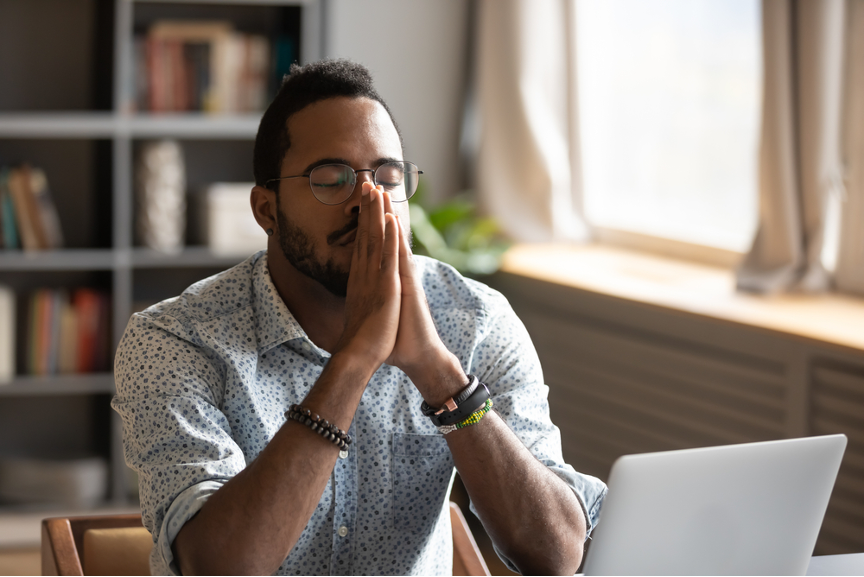17 Tips to Help You Cope with Uncertainty

These days, the most common topic that people approach me with is dealing with the vast amount of uncertainty and anxiety in their lives. The pandemic is still going on with new variants. One moment it feels like it’s almost over and other times there are increases of new cases. There’s also the ongoing war between Russia and Ukraine. In addition, there is the growing financial and emotional impact of inflation that is impacting housing, interest rates, food, and gas prices.
And the media – the news and social platforms – are a constant onslaught of crisis after crisis with politics, increasing crime, and natural disasters thrown in. But you already know all this.
There is also the compounding factor when so many things in life are up in the air. It adds up.
Uncertainty surrounds us right now and, for billions of us, it’s so much more than we have ever experienced before.
The Impact
All of this uncertainty has an impact, even upon the healthiest of us. We talk about it with our family, friends, and colleagues. Rare is the person who is not impacted by all of this in one way or another.
These stressors are impacting us individually and can place greater strain on our personal relationships. This may explain why there has also been an ever-increasing demand for mental health services in the last two years.
Sometimes it can also feel like we are blindfolded because we cannot know if and where the next crisis might be coming from.
So that’s the bad and the ugly.
Now for the good news
If you can identify more specifically how all of this is impacting you, then you have a much better chance of identifying what your core needs are and how to cope with uncertainty.
Here are some common and normally expected signs and symptoms when confronted with uncertainty and anxiety. They include but are not limited to the following:
● Having trouble sleeping
● Feeling like you cannot control your worries
● Feeling worried, tense, nervous, angry, easily agitated, and restless
● Feeling overwhelmed and at your wits’ end
● Having a sense of impending danger, panic, or doom
● Feelings of moodiness
● Feelings of helplessness and hopelessness
● Panic attacks
● Having an increased heart rate
● Having moments of rapid breathing (hyperventilation)
● Having fits of sweating or trembling
● Attempts to self-medicate the pain of all of this with alcohol, prescription, and non-prescription drugs, street drugs
● Trouble concentrating or thinking about anything other than the present concern(s)
● Avoiding things that trigger feelings of loss of control, panic, or worry
● Experiencing gastrointestinal (GI) problems, heart palpitations, rapid and shallow breathing, suppressed immune responses
● Feeling tired or weak often for days at a time
● Feeling drained and out of gas
Before I continue, I really want to re-emphasize that these responses are normal and expected. You are not going crazy although it may feel that way at times!
Particularly these days, it’s not uncommon that our typical coping techniques may not be working as reliably as we are accustomed to. It can be overwhelming. That’s okay.
If this sounds like you, I’ve created a number of time-tested tips to help you cope with all of this. Read through these and try the ones that resonate with you.
And of course, I encourage you to adopt any additional healthy approaches that you already know work for you.
Tips to help you cope with uncertainty
1. Start with an honest assessment of where you are right now
Focus on specific areas of uncertainty that are causing you anxiety and stress. Identify what you can and cannot control right now. Form an intention to work only on those things that are under your control. So many people have discovered that there’s no point in wasting time and energy focusing on those things that you can’t affect. So go to work where you can and celebrate small wins.
2. Make your self-care a priority
First and foremost, it is so easy to forget that we need to form specific intentions to embrace our own self-care. Some people say to me that they have to focus on taking care of others first and that they feel guilty about prioritizing their own needs. They confuse healthy self-care with selfishness. Think of it this way, if you don’t take care of yourself, it’s likely that you burn out and you won’t be of any help to yourself or others.
So, what can you actually do for your self-care? The following you probably already know, but it doesn’t hurt to remind yourself: physical exercise alternating with rest; getting plenty of quality sleep; meditation; yoga; eating healthy and nutritious snacks and meals; avoiding processed sugars and excess carbs; and eating plenty of proteins to help energize you both physically and mentally.
3. Make of list of your stress triggers
One of the very best things you can do is to be aware of the stressors in your life that are causing you stress. Make a list of your triggers and your specific signs and/or symptoms of stress. Living with uncertainty is stressful.
What are the particular areas of uncertainty that trigger you the most?
Knowing what your triggers are can help you anticipate the impact they may have. This can help you begin to assess what action, if any, you can take to alleviate at least some of your stress symptoms.
4. Make a list of your successes
Remember your past successes when you were faced with uncertainty? Make a list of those. You’ve had successes in the past, small ones, medium ones, and big ones! And you’ll have them again. Tip: It can help if you have someone who knows you to help make your list.
Spend some time reflecting on where you’ve been and some of the challenges that you’ve faced, and consider what you did that helped you overcome those past circumstances.
5. Do you really need to be certain?
You don’t have a crystal ball. Maybe you don’t need to have all the answers right now. Understandably, it’s not comfortable. But maybe this is a time to learn to better tolerate, even embrace, the inevitable uncertainty of life. It may be cliché to say that life has its ups and downs, but learning to ride the roller coaster of life is a part of the joy of living.
6. Do what feels good and is healthy for you
Reduce your anxiety and stress levels with self-care, healthy ways to comfort yourself, participate regularly in exercise that you enjoy, and/or spend time with people that rejuvenate you and leave you feeling positive.
7. Start a gratitude journal
You may not think that feeling gratitude in the midst of upheaval is intuitive. Actually, the opposite is true. Even during times of great uncertainty, people that are in touch with feeling gratitude tend to be much happier in life. It helps ground them in the goodness that they do have and can ride out the ups and downs that come with life with more grace…and a reduction in stress and anxiety.
It’s a simple practice that takes about 5 minutes a day. Start with 3 things that are good in your life right now. After doing this practice for a few days, watch the change in your mood, relationships, self-esteem, and even your physical health.
8. Surrender
I know. For many if not most people, that means giving up so, “Gary, why would you possibly suggest this?!” Good question. The answer depends on your definition of surrender.
When I use “surrender,” I view it as a form of acceptance. Don’t confuse surrender with giving up. It simply means that you are not pushing against and resisting the current reality.
Think of it this way. When you are playing poker, you can’t change the hand you are ultimately dealt. You play the hand you have.
“Surrender” under this definition is simply saying that you acknowledge that this is how things are right now. You don’t have to like it. It doesn’t mean that it’s always going to be this way. You can accept what is. You can also make a decision toward what action you may want to take now, or after some time, but for now, simply acknowledge what is.
9. What are you building a case for?
Be mindful of where your mind spends its time. When you find your mind going down the rabbit hole of what-ifs, ask yourself, “What am I building a case for?”
Consider the possibility that you’re only looking at the worst-case scenario or negative implications. Isn’t it just as possible, if not likely, that things could actually have a positive impact or result?
It’s like the Cherokee parable:
An old Cherokee is teaching his grandson about life. “A fight is going on inside me,” he said to the boy. “It is a terrible fight and it is between two wolves. One is evil – he is anger, envy, sorrow, regret, greed, arrogance, self-pity, guilt, resentment, inferiority, lies, false pride, superiority, and ego.”
He continued, “The other is good – he is joy, peace, love, hope, serenity, humility, kindness, benevolence, empathy, generosity, truth, compassion, and faith. The same fight is going on inside you – and inside every other person, too.”
The grandson thought about it for a minute and then asked his grandfather, “Which wolf will win?”
The old Cherokee simply replied, “The one you feed.”
In short, you may need to shift your focus from what is bothering you and focus on the positive outcomes you desire.
10. Practice mindfulness
One of the very best things you can do when facing uncertainty is to develop and use the practice of mindfulness. There are simple exercises to help you identify where in your body you are feeling stress. In turn, that will help you to decide what plan of action you may need to help manage the signs and symptoms of stress related to uncertainty.
11. Be proactive: Put your attention on the outcomes you want
Instead of sitting in uncertainty and despair, focus on what you want to happen. Spend some time daydreaming and imagining the best possible outcome (see #9 and feed the good desire). Ask yourself, “What can you learn from the situation? How can you create some good in these messy circumstances? What can I gain from this state of affairs?”
Creating a sense of purpose is a great way to ground yourself steadily and gives you something positive to focus on.
From there you can create a plan, make a list, set goals, or even a vision board about what you want to make happen.
12. Limit your media exposure
Watching the news or surfing your favorite social media platform keeps us wired and tired. This takes discipline, but notice how you feel after you spend time with the media. Then set limits on how much time you want to spend there. In this case, more is not better.
13. Notice how you may be jumping to conclusions
Just because someone coughed, doesn’t mean they have covid. It’s easy for all of us to jump to conclusions, but they are not always true. You may start to notice how often you’re doing this, especially under stress and uncertainty. Bring a little good humor to these efforts and come up with another likely scenario that lands on the brighter side of things. It may be just as likely of an explanation.
14. Connect with others with who you feel safe
Connecting with others is a great way to get outside our head and dark thoughts. This could be spending time with family or friends that you feel good around or even volunteering in your community.
It could be as simple as sharing a cup of tea.
15. Look from the outside in
If a friend came to you with the things that you were struggling with right now, what would you say to them? Take your own advice. Be a good friend to yourself.
16. Be kind to yourself
Not everyone is great at dealing with uncertainty all the time. And there’s a lot happening in the world right now, so you are absolutely not alone. There are billions of us feeling this way.
Don’t beat yourself up for where you’re at. Remind yourself that you may need a little time. Be patient with yourself and acknowledge that, like all of us, you are doing the very best that you can right now.
I’ll repeat myself because it’s worth repeating, please be extra kind to yourself.
17. Ask for help
It is totally understandable that sometimes it can feel so overwhelming and like you’re drowning in all of this. This is true for millions of us right now. If you feel that you need additional support to get you through these challenging times, ask for help. This could be from friends or family, your church or synagogue, or a professional. If you would like some help with all of this, I invite you to contact me for a free 15-minute phone consultation to see if I’m a good fit for what you need. I’m happy to help in any way that I can.





















